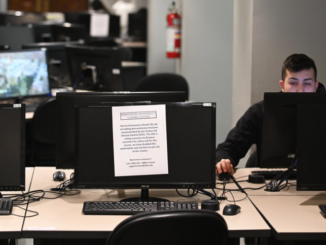
Sierra Rioux
Dominican students, faculty, and recent alumni have shared a variety of perspectives about reproductive healthcare in the wake of Donald Trump’s election win.
Xiomara Guerrero, a junior majoring in political science, said she feels worried about reproductive rights in the future.
Guerrero, who is from Texas, where abortion is tightly restricted, fears that such restrictions could spread.
“As someone who comes from a very red state, I can only imagine what they will do regarding reproductive rights. [It] is very frightening, especially since my insurance is based in Texas,” she said.
During Trump’s first administration, he nominated three Supreme Court justices who were instrumental in overturning the federal right to abortion in Roe v. Wade. Afterwards, several states passed strict laws limiting abortion rights.
In his second term, Trump stated he will leave abortion laws to the states but has not clarified the future of birth control and Plan B, which concerns Guerrero.
“I think if possible and given the choice and comfortability of wanting to take birth control, [I believe] every woman should have that right and not have [the government] take it away from them,” she said.
Christina Perez, a professor of sociology and women and gender studies, advocates for reproductive healthcare as a universal right.
“At the core of it is the health and wellbeing of individual people and the right to decide whether or not to become a parent,” she said. “It’s the fundamental right to have access to comprehensive sexual and reproductive health education and healthcare.”
Perez is also concerned about potential new restrictions as well as the popularity of period tracking apps, which are apps designed to understand menstrual cycles and predict periods, fertility, and ovulation. However, these can be used by prosecutors in states with abortion restrictions.
Dominican alumni Claire Groppe, who served as president of the anti-abortion group Stars for Life, has a very different opinion on this issue.
“[Our group] focused more on education [such as] what the abortion process is and where you can [find] resources to help you if you find yourself in a crisis pregnancy situation,” she explained.
Groppe, who grew up in an intensely anti-abortion Catholic family, shaped some of her beliefs and aligns with the church’s stance against abortion.
“As a Catholic, I cannot support abortion,” she said. “I believe abortion is the ending of a human life. I don’t think anyone should have the right to make that decision over a human life.”
While on campus, Groppe often felt that her beliefs were in the minority as she struggled to advocate for pro-life values. At one point, a Stars for Life pop-up display was taken down by university administration.
For Guerrero and other out-of-state students, the Wellness Center is their main resource for health issues or concerns.
Due to Dominican’s Catholic identity, there are limitations on provisions for reproductive health including condoms, birth control, and other contraceptive methods.
Perez also is disappointed with the lack of reproductive health care offered to students.
“I would say this school has never really done anything to support reproductive freedom because it’s not part of the official Catholic Church doctrine,” she said.
Groppe believes it is essential for students to receive comprehensive sex education.
“Having the condoms and contraceptives is actually worse mentally and somewhat physically, especially with contraceptives messing with women’s hormones and possibly making her sterile in the future,” she said.
Michael Purcell, director of the Wellness Center, said the center serves students in terms of meeting their basic needs for medical and mental healthcare.
“It’s about equity and justice around healthcare and access to healthcare,” he said.
The center also offers services including STI testing, pregnancy testing, basic gynecological exams, education counseling, and referrals according to Liz Heintz, a physician assistant.
They believe the goal is to engage students in conversations to help them make the best decision regarding their healthcare and connect them with important resources.
Guerrero highlighted that reproductive rights impact everyone, but not just the person carrying the child.
“This will affect doctors, educators, and families,” she said. “This issue is inescapable no matter who you are.”



